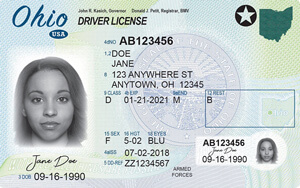- Updated for March 2025
- Based on official Ohio Driver's manual
Free Ohio BMV Permit Practice Test 2025
This Ohio BMV practice test has just been updated for March 2025 and covers 40 of the most essential road signs and rules questions directly from the official 2025 OH Driver Handbook. The first step to driving in Ohio is to pass a BMV written test to get your temporary instruction permit or TIPIC. If you’re 15 ½ or older, you are eligible to take the written test and get your TIPIC. The knowledge assessment will have 40 multiple-choice questions that cover traffic laws and vehicle regulations. To pass, you’ll need to score 75% or higher, so it can be useful to use BMV practice tests like this one. In addition to the written knowledge exam, you’ll also need to pass a vision test, and pay a $22 fee. Ohioans also have the option of signing up as an organ donor with their TIPIC, starting at age 15 ½ instead of the typical age 18 requirements.
- Perfect for learner’s permit, driver’s license, and Senior Refresher Test
- Triple-checked for accuracy
What you need to know

What to expect on the actual OH BMV exam
questions
correct answers to pass
passing score
minimum age to apply
List of questions (classic view)
- In which of the following situations are you NOT allowed to drive in the leftmost lane?
- If you are approached by an emergency vehicle displaying flashing lights and an audible signal, you must
- On a two-way road in Ohio, you may ________ after stopping at a red traffic signal.
- What does this sign mean?
- In a school zone, the speed limit when children are going to or leaving school is
- The letters "RR" painted on the pavement indicate that you are approaching
- On a one-way street, you may park your vehicle parallel to and not more than__________ from the right or left curb.
- This sign is used
- If you want to make a turn, you must start to signal at least ________ before you turn.
- A school bus is stopped with its red lights flashing on a street or road with fewer than four lanes. Which of the following is true?
- To maintain a safe following distance behind the vehicle ahead of you, use
- What does this sign indicate?
- Which of the following statements about Ohio's speed limits is true?
- If your vehicle stalls on railroad tracks when a train is approaching, what should you do?
- When you are being passed by another vehicle, you must _________ until the other vehicle has safely passed.
- What does this sign indicate?
- It is illegal to drive with a blood alcohol concentration (BAC) of _______ or higher.
- In Ohio, which of the following traffic violations carries six penalty points?
- You should not exceed the speed limit of ___ if there are no posted speed limit signs when driving on a city road.
- What does this sign mean?
- You may not use the opposing lane to pass another vehicle when you are
- Within a city or town, the speed limit in alleys is
- If you approach a vehicle with a triangular orange sign on its rear, what should you do?
- What does this sign indicate?
- In Ohio, it is illegal to make a left turn at a red light EXCEPT
- On one-way roadways, solid yellow lines are used as
- If you strike a deer and kill it, Ohio law requires you to
- This sign and pavement markings allow
- When you are closely following another vehicle at night, you must use
- If an oncoming vehicle has its high beams on, you should look __________ until the vehicle has passed.
- If the rear of your vehicle starts to skid on an icy road, what should you do?
- At an intersection, what does this signal mean?
- If you miss your exit on an interstate highway, what should you do?
- Under Ohio law, children who are under the age of _______ or weigh less than 40 pounds must be properly restrained in an approved child safety seat.
- You must use your headlights whenever you can't see objects __________ ahead clearly.
- This sign indicates
- Which of the following statements about pavement markings is correct?
- Which of the following statements about driving in fog is FALSE?
- While getting onto an expressway, you reach the end of the on-ramp. At this point, you should be traveling
- What does this sign indicate?
FAQs
Can the Ohio permit test be taken online?
No, in Ohio, the permit test, commonly referred to as the Temps test, must be taken in person at a Bureau of Motor Vehicles (BMV) office. Online testing is not available.
What is the Ohio Temps test like?
The Ohio Temps test consists of two parts: a road signs test and a road rules test. Each part includes 20 multiple-choice questions. To pass, you must correctly answer at least 15 questions in each part.
Can I get my license at 18 without a prior permit?
In Ohio, you can apply for a driver's license at 18 without having held a learner's permit. However, you are still required to pass the knowledge test, vision test, and road test.
How much does a learner's permit cost?
The fee for a learner's permit in Ohio is approximately $22. This cost includes the knowledge test and the Temporary Instruction Permit Identification Card (TIPIC).
Where can I take the Temps test?
The Ohio Temps test can be taken at any Ohio BMV driver exam station. It's advisable to check the nearest location and whether an appointment is needed.
How many times can I fail the permit test?
In Ohio, there's no limit to the number of times you can retake the Temps test. However, you must wait at least 24 hours before retaking the test, and additional fees may apply.
More resources
- Alabama: Test 1 / Test 2
- Alaska: Test 1 / Test 2
- Arizona: Test 1 / Test 2
- Arkansas: Test 1 / Test 2
- California: Test 1 / Test 2
- Colorado: Test 1 / Test 2
- Connecticut: Test 1 / Test 2
- Delaware: Test 1 / Test 2
- District of Columbia: Test 1 / Test 2
- Florida: Test 1 / Test 2
- Georgia: Test 1 / Test 2
- Hawaii: Test 1 / Test 2
- Idaho: Test 1 / Test 2
- Illinois: Test 1 / Test 2
- Indiana: Test 1 / Test 2
- Iowa: Test 1 / Test 2
- Kansas: Test 1 / Test 2
- Kentucky: Test 1 / Test 2
- Louisiana: Test 1 / Test 2
- Maine: Test 1 / Test 2
- Maryland: Test 1 / Test 2
- Massachusetts: Test 1 / Test 2
- Michigan: Test 1 / Test 2
- Minnesota: Test 1 / Test 2
- Mississippi: Test 1 / Test 2
- Missouri: Test 1 / Test 2
- Montana: Test 1 / Test 2
- Nebraska: Test 1 / Test 2
- Nevada: Test 1 / Test 2
- New Hampshire: Test 1 / Test 2
- New Jersey: Test 1 / Test 2
- New Mexico: Test 1 / Test 2
- New York: Test 1 / Test 2
- North Carolina: Test 1 / Test 2
- North Dakota: Test 1 / Test 2
- Ohio: Test 1 / Test 2
- Oklahoma: Test 1 / Test 2
- Oregon: Test 1 / Test 2
- Pennsylvania: Test 1 / Test 2
- Rhode Island: Test 1 / Test 2
- South Carolina: Test 1 / Test 2
- South Dakota: Test 1 / Test 2
- Tennessee: Test 1 / Test 2
- Texas: Test 1 / Test 2
- Utah: Test 1 / Test 2
- Vermont: Test 1 / Test 2
- Virginia: Test 1 / Test 2
- Washington: Test 1 / Test 2
- West Virginia: Test 1 / Test 2
- Wisconsin: Test 1 / Test 2
- Wyoming: Test 1 / Test 2
Your go-to, trusted source
Experience the Driving-Tests differenceOur commitment to accuracy and quality in our practice tests
Explore our rigorous, multi-tiered verification process that ensures each question mirrors the official manual for unparalleled accuracy.

At Driving-Tests.org, we understand the importance of reliable and accurate practice tests to help you prepare for your DMV exam. That's why we've developed a meticulous process to create and continually update our practice questions, ensuring they reflect the most current driving laws and regulations.
Here's an inside look at how we maintain the highest quality in our practice tests.
Content Creation and Verification Process
- Alignment with Official Manuals:
Every question we develop is based on the most recent version of each state's official driving manual. Our team regularly monitors each state DMV's website for the latest updates to ensure our practice tests are always aligned with the most current information. - Community Feedback Integration:
We leverage feedback from our vast community of users to understand which topics are most frequently tested. This helps us focus on the areas that are most relevant and beneficial for your preparation. - Expert Content Creation:
Our in-house editor, Steven, who has extensive experience in driver education, crafts each question with precision. He conducts a thorough review of each question against the official manuals to ensure accuracy. - Rigorous Review Process:
Once Steven has finalized a set of questions, our team conducts a joint review session. This second level of scrutiny involves content accuracy, proofreading, and fact-checking to eliminate any errors. - User Feedback Mechanism:
After a question goes live on our site, we keep the lines of communication open. Each question features a feedback button, inviting users to report any issues or errors. This continuous feedback loop allows us to address and rectify any concerns promptly. - Responsive Updates:
In line with our commitment to accuracy, we quickly update our practice questions to reflect any changes in the DMV manuals. Additionally, we update the free electronic copy of the state's driver's license manuals on our site, typically within a few days after the DMV publishes them.
Our thorough quality control process ensures that you have access to practice tests that are as accurate and up-to-date as possible. We believe in the power of well-prepared drivers and are dedicated to providing you with the best study tools to help you succeed on your DMV exam.
Pass the First Time - Guaranteed
Before you view your test results, discover how you can pass faster with Premium:
Real Exam-Like Ohio Questions
Get 650+ questions seen on the real test
Money-Back Guarantee
If you don't pass, it costs you nothing
97% Premium Users Pass on Their First Try
Compare with the average US passing rate of 49%
